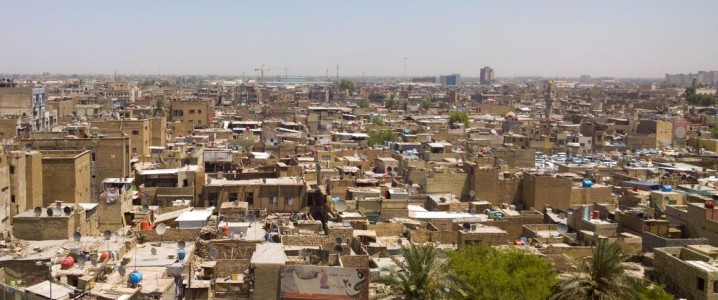Business
China Gains Ground in Iraq’s Crucial Oil Development Project

Control over Iraq’s oil resources is increasingly contested, particularly with the ongoing developments surrounding the Common Seawater Supply Project (CSSP). The CSSP is essential for enhancing oil output in Iraq, which boasts significant reserves. As competition intensifies between Western and Eastern firms, recent moves by the Chinese government signal a potential shift in control of this vital project.
The CSSP was initially spearheaded by ExxonMobil, with the China National Petroleum Corporation (CNPC) positioned as a secondary player. Following ExxonMobil’s withdrawal due to various operational challenges, CNPC took on a more prominent role. However, progress stalled, leading to TotalEnergies being awarded the primary development responsibilities as part of a broader US$27 billion deal to enhance Iraq’s oil and gas production.
Last week, the China Petroleum Engineering & Construction Corporation (CPECC) announced that its subsidiary, the China Petroleum Pipeline Engineering Corporation (CPPE), secured a US$2.524 billion contract to develop the Basra Province Seawater Transmission Pipeline Project (BSPP). This project will establish pipelines to transport treated seawater to oilfields in Basra, a critical component of the CSSP. Notably, CPECC is a subsidiary of CNPC, suggesting that China’s involvement in Iraq’s oil infrastructure is far from over.
The significance of Iraq in global oil markets cannot be overstated. According to the Energy Information Administration, Iraq holds an estimated 145 billion barrels of proved crude oil reserves, making it a key player in the Middle East. Unofficial estimates suggest that the actual figures could be even higher, with the International Energy Agency (IEA) projecting that recoverable resources may reach around 246 billion barrels when including the semi-autonomous region of Kurdistan.
Geographically, Iraq’s location is strategic, providing essential routes for trade between East and West. This positioning is particularly relevant for China’s ambitious Belt and Road Initiative (BRI), which aims to expand infrastructure and trade networks. Oil and gas contracts not only secure energy resources but also grant developers rights to ensure site protection through necessary means, including deploying security personnel.
The Oil for Reconstruction and Investment agreement, established between Baghdad and Beijing in September 2019, facilitated Chinese investments in Iraq’s infrastructure in exchange for oil. This partnership is further solidified by the Iraq-China Framework Agreement of 2021, which enhances China’s influence in the region.
Iraq’s US$17 billion Strategic Development Road (SDR) program aims to create a transport corridor that connects the deepwater Al Faw Grand Port in Basra to key oil fields and extends into Turkey and Europe. This infrastructure is vital for Iraq to enhance its oil output, which has historically been hindered by inefficiencies and corruption.
The CSSP is designed to facilitate the injection of seawater into oil reservoirs, a process integral to maintaining pressure and maximizing production longevity. Reports from 2012 revealed that Iraq could potentially increase its oil output from approximately 3 million barrels per day (bpd) to a plateau of 13 million bpd by 2017, highlighting the urgency of the project. To sustain higher production levels, Iraq would need to inject seawater equivalent to around 2% of the combined average flow of the Tigris and Euphrates rivers.
While ExxonMobil previously had the expertise to implement these plans, the company faced challenges related to corruption within Iraq’s oil sector, which allowed CNPC to gain traction. Despite initial setbacks, CNPC’s continued presence in Iraq’s oil landscape demonstrates a persistent effort to reclaim leadership roles in key projects.
Unfortunately for TotalEnergies, the Iraqi authorities have attempted to impose similar questionable practices on the French firm as they did with ExxonMobil. In 2022, TotalEnergies hesitated to proceed when faced with the potential revival of the Iraqi National Oil Company (INOC), often criticized for its corruption.
If Iraq can maintain a more transparent operating environment, TotalEnergies may succeed in advancing its projects. Nonetheless, the history of CNPC and CPECC in replacing Western firms in critical projects suggests that the competition for control of Iraq’s oil resources is far from resolved.
In summary, Iraq remains a pivotal player in the global oil market, with significant implications for international relations. As China reasserts its presence through key contracts and strategic initiatives, the landscape of oil development in Iraq is likely to evolve, with potential shifts in control that could reshape the region’s energy dynamics.
-

 World3 days ago
World3 days agoCoronation Street’s Shocking Murder Twist Reveals Family Secrets
-

 Entertainment4 months ago
Entertainment4 months agoKate Garraway Sells £2 Million Home Amid Financial Struggles
-

 Entertainment3 months ago
Entertainment3 months agoAnn Ming Reflects on ITV’s ‘I Fought the Law’ Drama
-

 Health3 months ago
Health3 months agoKatie Price Faces New Health Concerns After Cancer Symptoms Resurface
-

 Entertainment3 weeks ago
Entertainment3 weeks agoCoronation Street Fans React as Todd Faces Heartbreaking Choice
-

 World4 weeks ago
World4 weeks agoBailey Announces Heartbreaking Split from Rebecca After Reunion
-

 Entertainment6 days ago
Entertainment6 days agoTwo Stars Evicted from I’m A Celebrity Just Days Before Finale
-

 World6 days ago
World6 days agoKevin Sinfield Exceeds Fundraising Goal Ahead of Final Marathons
-

 Entertainment3 months ago
Entertainment3 months agoCoronation Street’s Carl Webster Faces Trouble with New Affairs
-

 Entertainment3 months ago
Entertainment3 months agoWhere is Tinder Swindler Simon Leviev? Latest Updates Revealed
-

 Entertainment4 months ago
Entertainment4 months agoMarkiplier Addresses AI Controversy During Livestream Response
-

 Science2 months ago
Science2 months agoBrian Cox Addresses Claims of Alien Probe in 3I/ATLAS Discovery



















